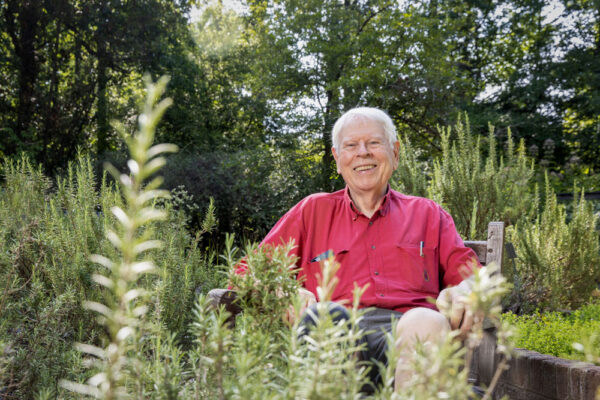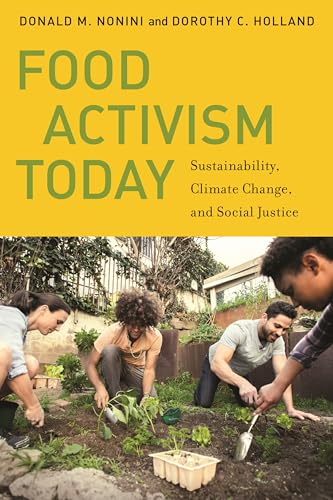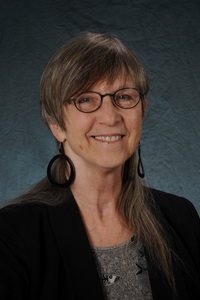In 1978, Donald “Don” Nonini found himself in the middle of Bukit Mertajam, Malaysia — a market town that was a center of regional transport for the country. While there, he observed how food came and went: Outbound trucks were loaded with chickens to be shipped more than 200 miles away to the capital of Kuala Lumpur, and inbound vehicles arrived from Thailand and Singapore delivering crates of fresh fish and produce.
That scene in the Malaysian market is something Nonini thinks about now as he evaluates the global food system and its struggles. For example, industrial agriculture is responsible for one-quarter of global greenhouse gas emissions, and in the next 20 years, it could lead to the extinction of up to 1 million plant and animal species.
Nonini’s latest project — “Food Activism Today: Sustainability, Climate Change, and Social Justice,” a book based on research completed in the mid-2000s — addresses alternatives to industrial agriculture. He and Dorothy Holland, a longtime Carolina anthropologist who passed away in 2019, interviewed food activists from the mountains to the coast to uncover the state of the sustainable food movement across North Carolina.
More specifically, they wanted to understand the motivations of food security workers and sustainable farmers, the impact of class and racial hierarchies, and the ethics and issues surrounding alternative approaches to food production.
“Food activists are our best chance for building a sustainable and just agriculture outside the dominant fossil fuel-driven industrial food system,” Nonini says. “For our own sakes — and for those of the younger generation — we need to change the food system or else we’re not going to survive.”
Anthropology adventures in Asia
Nonini found himself drawn to Asian cultures from a young age. After graduating with a philosophy degree, he took a Mandarin course and was ultimately drawn to the anthropology PhD program at Stanford University because they had one of the greatest living Chinese language experts in the United States, according to Nonini.
“His name was G. William Skinner. He’s known today for being a great historical anthropologist of China. And he was interested in rural marketing systems, which are all about food, and how they’re connected to urban areas,” Nonini explains.

Donald Nonini (photo by Alyssa LaFaro)
After joining the Carolina faculty in 1987, Nonini spent the next two decades visiting Malaysia for his research. He found a fast friend in anthropologist Dorothy “Dottie” Holland, who joined the university in the 1970s and whose previous work also took place across the globe, specifically in Samoa.
But going to the other side of the world is demanding, and Nonini needed to shift some of his focus to the U.S. He, Holland, and five collaborators came together in the late 1990s to work on a project in North Carolina. They spent one year attending public meetings and interviewing locals in communities across the state to gauge how people from all walks of life experience politics beyond voting.
Their book on this work, “Local Democracy Under Siege: Activism, Public Interests, and Private Politics,” won the Society for the Anthropology of North America Book Award — and set the stage for their next, and most recent, project.
Market over matter
One of the foundational tenets examined in “Local Democracy Under Siege” is neoliberalism, an economic philosophy that supports minimal government interference in the economy and encourages free trade, globalization, and deregulation.
“Neoliberalism was this idea adopted by theoretical thinkers in Europe in the 19th and early 20th centuries that basically said the state can’t meet human needs,” Nonini explains. “Only the market can meet human needs. And anything that gets in the way of an optimal market functioning will not lead to the betterment of society and the welfare of the people in it.”
An example of neoliberalism is the outsourcing of goods to the lowest bidder. Many products are manufactured outside of America in places like Mexico and China, where labor is cheaper. This is particularly true in the U.S. agricultural economy. Between 2011 and 2021, 35% of our vegetables came from outside the country.
Many scholars, including Nonini and Holland, don’t support neoliberalism because moving production to other countries affects local workforces. And they write extensively about its effects on small N.C. farmers and food activists in their most recent book, “Food Activism Today.”
Homegrown food futures
Nonini and Holland’s book unpacks the history of the food movement nationally and then zeroes in on North Carolina. Their team included four research associates, each of whom spent a year in the field interviewing food activists across the state — from Watauga and Ashe counties in western N.C. to the large cities of Charlotte and Durham to Edgecombe and Nash counties in the east.
They define food activists as falling into one of two groups: food security activists — people who work for nonprofit food organizations like churches, charities, and food banks to reduce hunger — and sustainable farmers, people who grow food for their own community.
 After reviewing the interviews, the researchers found a few trends. First, neoliberalism and the terms that often accompany it have different meanings for many of the people they interviewed. For example, “efficiency” in a neoliberal market means low-cost, but for many food activists it means the number of people who benefitted from their food.
After reviewing the interviews, the researchers found a few trends. First, neoliberalism and the terms that often accompany it have different meanings for many of the people they interviewed. For example, “efficiency” in a neoliberal market means low-cost, but for many food activists it means the number of people who benefitted from their food.
Additionally, they discovered that people of low socioeconomic status can’t afford high-quality food, and small farmers often struggle to make a living. And they wanted to know why.
“Then what we tried to do is find the people who were simultaneously trying to reduce food insecurity to increase people’s well-being while promoting sustainable agriculture,” Nonini says. “We called them our crossovers.”
“Crossovers” fill the roles of both food security activists and sustainable farmers in their community. One example is F.A.R.M. Café in Boone, N.C., which offers nutritious meals from locally grown produce using pay-what-you-can-pricing so that anyone can enjoy the food there. In fact, F.A.R.M. stands for “feed all regardless of means.”
“[F.A.R.M. Café] confronts a key limitation of the charitable food sector: how to overcome the class division and humiliations that characterize the contemporary charitable food sector and drive poor people away from accessing it,” Nonini writes.
Ultimately, Nonini and Holland believe that sharing these crossovers provides a framework for how alternative food systems can be organized, protected, and grown.
A dedication for Dottie
Writing and completing “Food Activism Today” is Nonini’s final project with Holland, who passed away in 2019 from cancer. From 2012 to 2016, Nonini met with Holland every week to discuss the project. Even after her retirement and diagnosis, they continued to work together regularly.

Dorothy Holland (photo courtesy of UNC-Chapel Hill)
“We continued this weekly rhythm of collaborating together, with interruptions for chemo and recovery, to within three weeks of her death. On April 13, 2019, she passed away,” Nonini shares. “I was devastated. She was not only a long-time colleague and a mentor to me when I began at UNC, but also a very good friend who I loved and deeply respected, like so many others she interacted with.”
Holland worked at Carolina from 1975 to 2016 and was an expert in social movements. One of her final studies explored how Black men understand and experience race, and one of her best-known books uncovered how women who studied math and science in college were diverted from their careers by partnership. Over the course of her career, she authored more than nine books and 70 journal articles and served as chair of the anthropology department.
Nonini has always admired the way she mentored graduate students and engaged them in the research process. She was good at it, and the proof was in the pudding: In 2017, more than 30 students and faculty honored her accomplishments at the American Anthropology Association meetings in Washington, D.C.
“Although I loved writing this book, writing is difficult work,” Nonini shares. “Sometimes you do it because of the love of the subject, and sometimes you do it out of a sense of loyalty to the colleagues and friends whom you have worked with.”
Here’s to you, Dottie.


